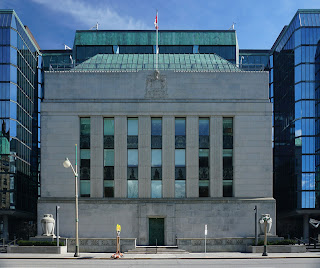Conversations about perpetual growth
.jpg) |
| Does the Pope understand overshoot? |
However, during my lifetime I have managed to engage three people in conversations (of sorts) about perpetual growth. I’d like to share those conversations with you.
The first was when I was a teenager in the 1970s, and I was starting to explore the world of ideas and developing ideas of my own about how the world works (or ought to). I was puzzled by the Pope’s 1968 proclamation that contraception was sinful, so I wrote to our local Bishop about it. “Surely”, I wrote, “the human population can’t continue expanding forever, and we therefore need some humane way of keeping our numbers in check other than the traditional methods of war, disease and famine. So the Church should be supporting contraception.”
The wise Bishop replied “God said ‘Be fruitful and multiply’. We don’t know how many people the Earth can hold, therefore we should keep increasing our numbers until we hit that limit. Then God will tell us what to do next.”
I felt uneasy about that response but I didn’t have the words or the concepts to know why; just that it didn’t seem quite right. Now, half a century later, I can see that there were two problems with it. Apart from the obvious one - if God doesn’t exist we could be waiting a very long time to be told what to do next - what the good Bishop failed to consider (or chose to ignore) was the problem of overshoot. If the number of humans or animals reaches the maximum carrying capacity of their local environment, their population usually doesn’t conveniently stop growing at that point. It usually keeps on growing until the available resources are depleted and the environment damaged, then it crashes. Is that really what God intended for us?
Pope Francis recently upheld the teaching of the 1968 Papal encyclical about contraception.
 |
| Does the Bank of Canada understand arithmetic? |
Fast forward 40 years and I had another conversation about perpetual growth, this time with the Bank of Canada which is Canada’s central bank, equivalent to the US Federal Reserve or the UK’s Bank of England. I was living in Canada at the time and I was concerned about the Bank’s economic growth forecast of 3.4% per year. That sounds fine provided you only look a couple of years ahead, but over a longer period it doesn’t make any sense. If the economy grows at 3.4% per annum for 80 years (an average Canadian lifespan), at the end of that time it would have grown to 1,451% of its current size, which looks impossible. I asked the Bank:
“1. Is a desirable target for Canadian economic growth 3.4 per cent per annum? and
2. Do you see this rate being maintained beyond the horizon of your current forecasts?”
You can read the reply from their public relations department here. It has a strange almost robotic quality to it, as though the writer was cutting and pasting from a script. Let’s hope that Artificial Intelligence (AI) never catches on in public relations departments, because instead of communicating with a person who sounds like a robot, I would be communicating with a robot who sounds like a person, and I’m not sure which would be worse. The gist of the answer was:
1. “We don’t have targets for economic growth”; and
2. “We only forecast three years ahead”
Both of these answers neatly sidestepped my main point, which is that perpetual growth is impossible. It was unthinkable, so the Bank did its best not to think about it.
 |
| Does the BBC support slavery? |
My most recent conversation took place two months ago. I am back in the British Isles and I was puzzled as to why I had never heard any news reporter challenge any politician about the impossibility of perpetual economic growth, even though politicians promoting economic growth appear on our TV screens almost every night. Newsrooms are staffed by bright young people with university degrees - surely some of them must be able to do simple arithmetic and join the dots? So I decided to tackle the British Broadcasting Corporation (BBC) about it.
Complaints to the BBC must fit into one of a limited number of pigeonholes, including “bias”. So I framed my question as a complaint about bias, specifically, why is the BBC biased in favour of neoclassical economic orthodoxy and never puts the other side of the argument to the interviewee i.e. ‘is perpetual growth possible, and if not, how does this affect your predictions for growth?’ “If the BBC thinks I am wrong about this”, I said, “please can you give me an example of a BBC interviewer challenging an interviewee on this point? And if you can’t find an example of this, does that not prove my point?”
You can read the BBC’s reply here. To be fair, the reply seems to have come from a real person who had given real thought to the question, rather than someone just reading from a script. He could not produce an example of any BBC interviewer ever challenging any politician about perpetual growth. He did, however, explain the BBC’s thinking. In news coverage, he said, the BBC needs to take account of “the likely audience expectation and any signposting that may influence that expectation” and “minority views do not have to be given similar prominence or weight to those with more support or to the prevailing consensus.”
The logical but depressing conclusion which I draw from this is that if the “prevailing consensus” and “audience expectation” was in favour of slavery, or colonialism, or racial segregation, or burning witches, or exterminating Jews, then the BBC would happily promote those ideas and would not feel obliged to report dissenting “minority views”.
Well, at least he answered the question. As these conversations usually raise my blood pressure, give me a tension headache and don't achieve anything useful, maybe I should stick to gardening. More about that in September.
Slaynt vie, bea veayn, beeal fliugh as baase ayns Mannin
Image attributions
Pope: By Quirinale.it, Attribution, https://commons.wikimedia.org/w/index.php?curid=115828333
Bank of Canada: By 方畢可 - Own work, CC0, https://commons.wikimedia.org/w/index.php?curid=116846771
BBC: By Igbofur - Own work, CC BY-SA 4.0, https://commons.wikimedia.org/w/index.php?curid=102777358



2.jpg)
Comments
Post a Comment